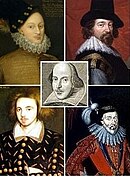| The Right HonourableThe Lord PenzancePC | |
|---|---|
 | |
| Born | 12 July 1816 (1816-07-12) London, England |
| Died | 9 December 1899 (1899-12-10) (aged 83) |
| Nationality | British |
| Alma mater | Trinity College, Cambridge |
| Spouse |
Lady Mary Pleydell-Bouverie
(m. 1860) |
James Plaisted Wilde, 1st Baron Penzance, PC (12 July 1816 – 9 December 1899) was a noted British judge and rose breeder who was also a proponent of the Baconian theory that the works usually attributed to William Shakespeare were in fact written by Francis Bacon.
Background and education
Born in London, he was the son of Edward Archer Wilde, a solicitor, and Marianne (née Norris). His younger brother Sir Alfred Thomas Wilde was a Lieutenant-General in the Madras Army, while Sir John Wylde (Chief Justice of the Cape Colony) and Thomas Wilde, 1st Baron Truro (Lord Chancellor) were his uncles.
He was educated at Winchester College and Trinity College, Cambridge (matriculated 1834, graduated B.A. 1838, M.A. 1842). He was admitted to the Inner Temple in 1836, and called to the Bar in 1839.
Legal career
He became a successful lawyer himself and was appointed a Queen's Counsel in 1855. He was knighted in 1860, shortly after his appointment as a Baron of the Exchequer. He presided over the Court of Probate and Divorce from 1863 until his retirement in 1872, being raised to the peerage as Baron Penzance, of Penzance in the County of Cornwall, in 1869. He was the judge in the sensational Mordaunt divorce case.
In 1875, he accepted the post as Dean of Arches and presided over a number of notorious trials; Bell Cox, Dale, Enraght, Green and Tooth, under the Public Worship Regulation Act 1874 arising out of the Ritualist controversy in the Church of England.
In 1866, he presided over Hyde v. Hyde, a polygamy case. In his ruling, Lord Penzance stated:
What, then, is the nature of this institution as understood in Christendom?...If it be of common acceptance and existence, it must have some pervading identity and universal basis. I conceive that marriage, as understood in Christendom, may for this purpose be defined as the voluntary union for life of one man and one woman, to the exclusion of all others.
This remained the common-law definition of marriage throughout the British Empire and successor states. In Canada, it was overruled by an explicit statutory definition in the Civil Marriage Act 2005, which allowed for same-sex marriage.
Shakespeare
Wilde argued, following Lord Campbell and others, that the works of Shakespeare are extremely accurate in matters of law. In The Bacon-Shakespeare Controversy (1890) he wrote of "Shakespeare's perfect familiarity with... English law... so perfect and intimate that he was never incorrect and never at fault", arguing that this was evidence that the plays were the work of a legal expert such as Bacon. Several other authors followed Wilde's arguments about the legal expertise used in Shakespeare, including Sir George Greenwood. Opponents of Wilde's view argued that Shakespeare's knowledge of the law was not exceptional.
Family and gardening
He married Lady Mary, daughter of William Pleydell-Bouverie, 3rd Earl of Radnor, in 1860. There were no children from the marriage. The couple resided at Eashing Park, Godalming.
At his garden in Godalming, from Rosa eglanteria and Rosa foetida he produced two new roses named Lady and Lord Penzance. He went on to produce a further 14 roses named after characters in the novels of Sir Walter Scott, including the Jeanie Deans Hybrid Rose.
Bibliography
Dewar, Mary. (1964). Sir Thomas Smith: A Tudor Intellectual in Office. London: Athlone. Strype, John. (1698). The Life of the Learned Sir Thomas Smith, T. D.C.L. New York: Burt Franklin, 1974. ISBN 0-8337-3447-4. Wilde, J.P. (1902) Lord Penzance on the Bacon-Shakespeare Controversy - A Judicial Summing-Up Wilde, J.P. (ed.) M.H. Kinnear (1992) Lord Penzance's Trial of Shakespeare: Verdict for Bacon ISBN 1-85571-308-X
Arms
|
References
- thepeerage.com James Plaisted Wilde, 1st and last Baron Penzance
- "Wilde, James Plaisted (WLD834JP)". A Cambridge Alumni Database. University of Cambridge.
- "No. 22381". The London Gazette. 1 May 1860. p. 1641.
- Sir John Sainty (comp.) The Judges of England, 1272-1990: a list of the judges of the Superior courts (Selden Society: Supplementary Series 1993, 10), 132.
- "No. 23485". The London Gazette. 6 April 1869. p. 2113.
- Pall Mall Gazette, 11 March 1875
- ^ Rigg 1901.
- ^ Brian Jay Corrigan, Playhouse Law in Shakespeare's World, Fairleigh Dickinson University Press, Madison, NJ., 2004, p.195-196.
- Burke's Peerage. 1891.
- Attribution
Rigg, James McMullen (1901). "Wilde, James Plaisted" . In Lee, Sidney (ed.). Dictionary of National Biography (1st supplement). London: Smith, Elder & Co.
External links
| Peerage of the United Kingdom | ||
|---|---|---|
| New creation | Baron Penzance 1869–1899 |
Extinct |
- 1816 births
- 1899 deaths
- 19th-century English judges
- English gardeners
- English rose horticulturists
- Rose breeders
- English literary critics
- English Anglo-Catholics
- Barons in the Peerage of the United Kingdom
- Baconian theory of Shakespeare authorship
- British King's Counsel
- Shakespeare authorship theorists
- Alumni of Trinity College, Cambridge
- Barons of the Exchequer
- 19th-century British journalists
- British male journalists
- Members of the Inner Temple
- Members of the Privy Council of the United Kingdom
- Members of the Judicial Committee of the Privy Council
- Peers of the United Kingdom created by Queen Victoria
